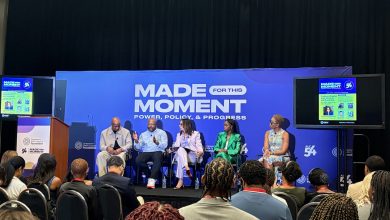With Black Unemployment Hitting A 5-Year High, Have Race And DEI Become Scarlet Letters?

(Photo by Darrell Ingham/Getty Images)
Getty Images
There’s a statistic buried in the July jobs report that deserves far more attention than it’s getting: Black unemployment has climbed to 7.2%, its highest level in nearly five years.
That figure should ring alarm bells, but it’s been met with silence in mainstream media, primarily getting headline coverage across Black media. After a surge in black hiring after the racial reckoning of 2020, it seems America has entered a new, more subtle era—one where race feels like a liability in the labor market, as equity goals and DEI are quietly being walked back.
In July, 73,000 nonfarm payroll jobs were added in the US, well below expectations. Beyond that, May and June’s job gains were adjusted in downward revisions, slashing a combined 258,000 jobs that had been previously added. The sectors that traditionally employ Black workers in large numbers—retail, transportation, and manufacturing— have barely moved upward. And one area that has long stood as a pathway of opportunity for Black professionals, particularly Black women—the federal government—accounted for 12,000 jobs cut in a single month. Overall, more than 84,000 federal positions have been cut since January.
Black women, in particular, are being pushed to the margins. With nearly 300,000 having left the labor force in the past 90 days, even though they earn more college degrees than any other race-gender group in the United States.
While the headlines read —modest job growth, low national unemployment— for Black America, the story is playing out differently.
What gives?
HOUSTON, TX – MAY 13: A mural painted in honor of George Floyd on Twee?s Foods Store in Houston. (Elizabeth Conley/Houston Chronicle via Getty Images)
Houston Chronicle via Getty Images
The Changing Narrative on Race and DEI
In 2020, corporations, governments, and institutions made seemingly endless public commitments to racial equity. That was the year DEI roles were flourishing. For a moment, there was momentum.
Fast forward to today, and we’re seeing a stark reversal. Since the inauguration, DEI departments have been, and are continuing to be dismantled as names and titles are being changed. At the same time corporate pledges are being quietly sunset. The result is this: Black professionals are now being disproportionately impacted by layoffs.
And Since 2023, U.S. employers have eliminated more than 2,600 jobs with words including “diversity” or “DEI” in the titles or descriptions.
Which raises a chilling question: Have race and DEI become scarlet letters in today’s America?
In 1850, Nathaniel Hawthorne’s novel The Scarlet Letter described the plight of a woman, Hester Prynne, who was forced to wear a scarlet letter on her dress as a sign of shame. The letter ‘A’, for adultery, could be seen by all that came around her, and was something she couldn’t hide. The letter was a mark of shame – and limited both her life and her opportunities.
Is this becoming a parallel for race and DEI today?
The silence around this month’s report seems to suggest so. With no urgent calls from policymakers and nary a think pieces from economists, we’re watching a slow fade of resources and professional support. From budgets, to company websites to corporate sponsorships – less Black faces are showing up in places they dominated not long ago.
How Can We Show Strength In The Face of Adversity?
Like Hester, who was able to turn the tides on the scarlet letter in the end, we must take this moment as an opportunity to do the same by taking three deliberate actions:
- Support Black Owned Businesses – There are 3.7 million Black-owned businesses in America, and each play a crucial role in the economy, employing over 1.2 million people and generate $211.8 billion in revenue (up 66% in the past few years). These businesses represent a significant contribution to the U.S. economy and an opportunity to invest in those no longer in the workforce, who have gone on their own.
- Increase Mentorships – We must bridge the knowledge gap to inform people of these facts that some times live ‘between the lines’, so they too can take action once they are in the know. Helping improve the skills of those not working can improve their chances and fortunes.
- Advocate Through Actions – For those currently working in the labor market, share via LinkedIn internal job openings, internship opportunities and how to gain access to procurement departments, all of which help create a pathway to get back in the system.
Every day, people make decisions with their feet, their voices, and their wallets. These times are laying the foundation for consequences that could be generational. Just one change in behavior could help support someone responsible for keeping their households together and serving as a pillar in civic life.
The scarlet letter should never be about race to begin with.
But if perception is reality, then it’s up to us to erase it.





